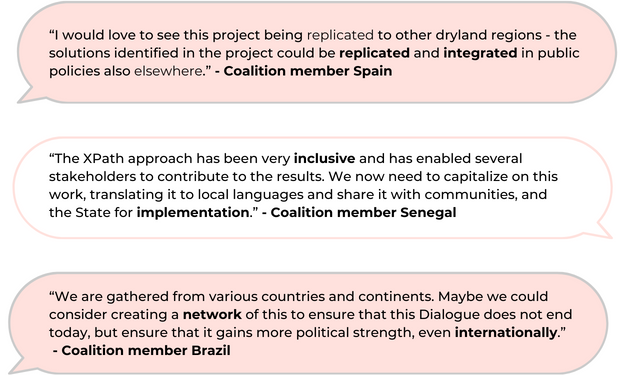The XPaths project's final dialogue was held online, on January 25th 2024. The goal of the dialogue was to present the projects’ key insights and foster collaboration between local and global actors. Through connecting local actors from the case countries, Brazil, Senegal and Spain, the event fostered participants to engage in critical discussions on how the project’s insights can align current and future policy recommendations towards the Sustainable Development Goals (SDGs), encouraging like-minded organizations to explore collaborative strategies for action in the global efforts to support the implementation of the SDGs.
In the first part of the dialogue, we presented a synthesis of our approach, the commonalities across countries, a synthesis of the core challenges and proposed solutions (leverage points and interventions), and finally, an analysis of how the European Union could contribute to the implementation of the SDGs in each country. In the second part, we opened the floor for the participants to reflect on some guiding questions. The presentation can be found on our website in English, Portuguese, Spanish and French.
During the final dialogue, we had upwards of 50 participants joining from all around the globe. From Brazil, we had researchers and representatives from local organizations, social movements and representatives of Indigenous and traditional communities joining us. From Senegal, a range of different stakeholders joined, such as political representatives from local, departmental and national levels environmental experts and representatives of local NGOs and producer organizations. From Spain, we had researchers, political representatives from the province of Almería, institutional actors and representatives from environmental organizations and social movements. We also had global actors from the EU, from the Food and Agriculture Organization and from the United Nations Convention to Combat Desertification (UNCCD) joining the dialogue.
Recommendation for Policy and Practice
In the first part of the Final Dialogue, we present some recommendations on how the European Union could contribute to the implementation of the SDGs in each country. Based on the results of our cross-countries analysis, we highlight two themes in our recommendations:
Global initiatives that influence local sustainability, such as trade agreements, EU-level policies, and Development Aid programs, need to consider:
- Local concerns and solutions that do not necessarily align with country-level hegemonic perspectives;
- Multiple social-ecological impacts beyond rainforest loss, such as water use and quality, pollution, health issues, and loss of natural vegetation and biodiversity, etc.
- Last, but not least, the multiple inequalities and asymmetrical power relations that can potentially be reinforced by international actions.
In particular, initiatives related to transforming food and agricultural systems need to increase awareness of divergent perspectives and conflicting narratives about the desired future:
- The dominant narrative of agricultural intensification and expansion is incentivised and encouraged by important global initiatives, for example, the proposed draft document of the EU Mercosur Trade Agreement, the Development Cooperation Strategy with Senegal, etc. However, there are divergences about this narrative due to its social-ecological implications, leading in many cases to conflict and violence at the local scale.
- Brazil, Spain and Senegal are at different stages of the agriculture intensification process following the dominant narrative - which is being pushed top-down in Senegal. The social and environmental impacts currently seen in Brazil and Spain can be avoided in Senegal.
- The contrasting narratives are not only related to technical aspects of the production system but to the role of different actors in the production (corporations, small farmers, large farmers, etc.). Issues related to land ownership and unequal distribution of land (present and future) are often neglected in food system transformation literature and forums.
Integrated planning and management of the Food, Energy, Water and Land Tenure nexus is crucial to sustainable and just futures.
Input from the participants
During the second part of the Final Dialogue, we opened up the space for the participants to give their reflections on the XPaths process, where we received valuable insights and hopeful messages. Many of them gave their thoughts on the project’s potential for making short and medium-term impacts on implementing the SDGs in their regions:

We also received input on how this project can be useful on a higher political level:

Last but not least, many participants shared their hopes of what they wish this project could lead to:

Comments